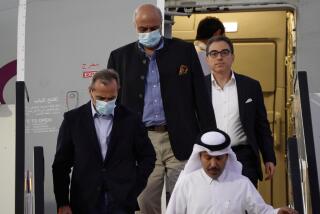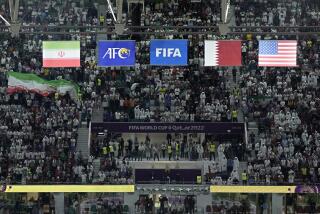AFTERMATH OF THE TOWER REPORT : Says Policy ‘Failed the American People’ : Bush Admits Hostage Trade Was Goal
BEDFORD, Mass. — Vice President George Bush acknowledged for the first time Friday that the Reagan Administration secretly sold weapons to Iran as part of a scheme to trade arms for hostages.
He said that policy had “failed the American people.”
In a campaign speech here, Bush indicated that he accepted the Tower Commission’s finding that “a pattern of successive bargained exchanges of arms and hostages was quickly established” after the weapons sales began in late 1985.
Bush is the highest-ranking Administration official yet to comment on the commission’s report. His statement indicates that the commission’s conclusions may force the White House to dramatically change the position to which it has clung over the past few months.
Reagan to Respond
The President has said that throughout the operation, the sales were primarily an effort to build a relationship with a faction of the Iranian government, not to obtain release of the hostages. Trading arms for hostages apparently would violate the official White House policy--which it has urged on allies overseas--of not bargaining with terrorists.
Reagan is expected to make his public response to the report next week.
Despite Bush’s acknowledgement that the policy became one of swapping weapons for hostages, he continued to insist that the sales originated solely as an effort to “reach out to factions in Iran in a manner that would further the security interests” of the United States and its Middle Eastern allies.
‘Efforts . . . Were Wrong’
“But the efforts in 1985 and 1986 did not work, and in some cases, were clearly wrong,” Bush told a local Chamber of Commerce here.
“Arms for hostages is wrong, and at this stage, the implementation of the policy failed,” he said. “And it failed the American people and it failed the President.”
He said the President has taken corrective steps and pledged that Reagan would make further changes, including what he described as a strengthening of the National Security Council.
While the Tower report criticized Reagan for not being involved in or aware of important details that guide White House policy, the vice president maintained: “The President is on top of this.”
Bush’s Earlier Pledge
Bush had said earlier this month that if the commission concluded that “the United States swapped arms for hostages, I’d be the first to say that the policy was wrong.” But in December he insisted that the release of hostages was merely a side benefit of the arms sales, offered as “proof of Iranian seriousness” about the diplomatic initiative.
The commission said relatively little about Bush’s own role in the operation, except that he attended the major meetings at which the policy was set into motion. Secretary of State George P. Shultz told the panel that Bush had supported the deals, although the vice president has said publicly that he had “certain reservations” about “certain aspects” of the affair.
Bush told the group Friday that the United States continues to have a policy of refusing to make concessions to terrorists.
He quoted the commission as finding that the President’s “intense compassion” for the hostages led him into the arms-for-hostages scheme.
Reagan ‘Cares Most’
“I have watched the President day by day, proudly sitting at his side, as he has agonized over these hostages,” Bush said. “The greatest burden is his. I think it is fair to say he cares the most.”
New Hampshire’s Republican governor, John H. Sununu, who has been traveling with the vice president, said Bush told him that one of the important facts that had been withheld from Bush and President Reagan was the fact that Iranian middleman Manucher Ghorbanifar had flunked a CIA-administered lie-detector test in January, 1986.
Friday, Bush said in a local television interview, “If the President had been told some of the things that are in that report (the sale of arms to Iran) wouldn’t have happened. But he was cut off.”
Supports ‘Star Wars’
As Bush made campaign stops here and in New Hampshire, he continued to express support for research on the President’s proposed Strategic Defense Initiative, an anti-missile defense system nicknamed “Star Wars.”
However, he did not go so far as to endorse early deployment of such a system. Conservatives had hoped he would use the speech as an opportunity to push for deploying the system, an option that is being considered by the Administration.
Early deployment would require a unilateral and controversial reinterpretation of the Anti-Ballistic Missile Treaty with the Soviet Union.
More to Read
Sign up for Essential California
The most important California stories and recommendations in your inbox every morning.
You may occasionally receive promotional content from the Los Angeles Times.










